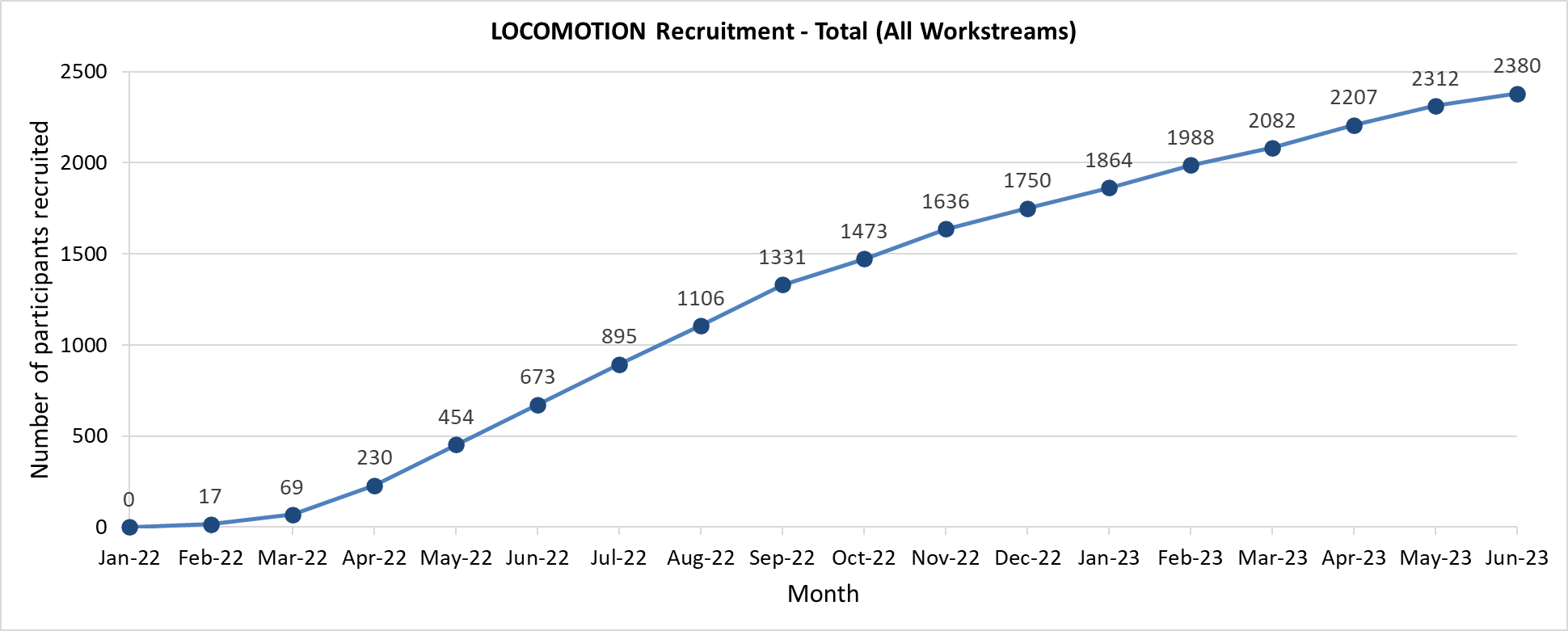LOCOMOTION June 2023 Newsletter
LOCOMOTION study recruitment reached 2,380 participants in June 2023!

Successful LOCOMOTION Conference / Away Day:
- In June we had a hybrid conference/'away day' for all members of the LOCOMOTION team. It was an opportunity for work package (WP) teams to present some of their current findings to the wider study team. We also hosted workshops for attendees to discuss topics that would support upcoming work over the final six months of the study and beyond!
- Also, for those who were able to attend in-person, it was a chance for many team members to meet some colleagues face-to-face for the first time after working with them on the study for two years!
- We had 30 attendees in-person and 29 joining virtually, making for a truly hybrid event with those attending remotely also being involved in the workshops and the post-presentation Q&As.
- Visit our news item about the conference to read about the contents of the presentations and the topics of our workshops.

LOCOMOTION Publications:
- The third paper in our BMJ Practice Pointer series has been published! - ‘Breathing difficulties after covid-19: a guide for primary care’.
- A protocol paper for our 'Home Monitoring of Long COVID Symptoms' work package has been accepted by the BMJ Open, and will soon be published. - ‘Digital home-monitoring for capturing daily fluctuation of symptoms: a longitudinal repeated measures study protocol’.
- Our 'Cost-Effectiveness of Alternative Pathways' work package have submitted a paper on the ‘Impact of LC on productivity’ for publication.
- Visit out Scientific Publications page to view all the LOCOMOTION publications to date.

Other Long COVID Publications:
- A new publication in the BMJ Open shows Long Covid (LC) can impact fatigue and quality of life worse than some cancers — ‘Impact of fatigue as the primary determinant of functional limitations among patients with post-COVID-19 syndrome: a cross-sectional observational study’.
- Clare Rayner, Co-Lead of our Patient Advisory Group (PAG), has written an article for the Institution of Occupational Safety And Health (IOSH) Magazine. In the article - ‘Seriousness of LC’ - from her background as an occupational health physician, Clare discusses the cognitive risks of LC in relation to work, provides return to work advice, and highlights the impact of reinfection.
![]()
Work Package (WP) Updates:
- WP1.1 (Quality Improvement Collaborative) - Members of the LOCOMOTION team met to discuss ‘Persistent LC’ (LC lasting over 12 months), and from this two spin-off working groups were formulated:
- A group creating a sixth BMJ Practice Pointer article, which is focused on 'persistent LC': “what can/should the GP do for patients who have been discharged from the LC clinic but are still not well?”
- A group conducting data extraction and linkage to evaluate LC patients who are still not better after 12 months.
- WP1.1 (Quality Improvement Collaborative) - Following on from the publication of our BMJ practice pointer on Orthostatic tachycardia after covid-19, our NHS sites have been using the NASA Lean Test to test the prevalence of tachycardia on standing in LC. So far, 96 patients attending the LC clinics have been tested!
- WP1.2 (Experience-Based Co-Design) - Phase two of our interviews with LC patients to understand their experiences within clinics are underway. So far, ten patients have been interviewed in phase two. Once all the interviews are complete, they will analysed and compared to those from phase one to understand any changes in experiences.
- WP1.3 (Health Inequalities) - Jordan Mullard presented findings from this WP at a 'Qualitative Long Covid Network' event at University College London in June.
- WP1.4 (Vocational Rehabilitation) - A PAG member from this WP will be presenting at a Trade Union Congress using data from the LOCOMOTION study to illustrate the financial impact of LC and highlight people's experiences with the Department for Work and Pensions (DWP).
- WP2.2 (Patient Reported Outcome Measures) - Mike Horton presented at the UK Patient Reported Outcome Measures (PROMs) Conference in June. He presented findings from the validation testing of the modified C19-YRS LC outcome measure. His presentation received good feedback about the rigor of the testing!
- WP3.1 (Pathway Development) - The WP team have been granted access to a Northwest London Whole Systems Integrated Care (WSIC) dataset, and early findings from the analysis of this were presented at the LOCOMOTION conference.
![]()
LOCOMOTION Team:
- Congratulations: Dr Manoj Sivan (LOCOMOTION Co-Chief Investigator) has been appointed chair of the INternational Framework fOr Rehabilitation Medics task force by The International Society of Physical and Rehabilitation Medicine!

Work Package Profile - 2.2 (Validating digital outcome measures) and 3.2 (Evaluating cost effectiveness of pathways)
- Background -
- The LOCOMOTION LC clinics are using ELAROS’s NHS England-recommended digital PROM C19-YRS system, which has a patient facing phone application and clinician facing web portal for monitoring symptoms and guiding interventions. The system allows collation of a larger data set from across the 11 participating NHS sites. PROM data will be validated to determine its psychometric properties of scale acceptability, reliability, construct validity, criterion validity and responsiveness in a demographically diverse group of LC patients. Rasch analysis (to measure the extent to which the scale measures the underlying condition) will provide the basis for further refinement and development of the scale (WP2.2).
- The idea for WP2.2 was generated by recognising the multitude of PROMs available for symptom monitoring and the need for a multi-domain, LC specific measure to reduce questionnaire burden for patients. Secondly, the digital nature of the platform allows services to streamline existing pathways, reduce dependency on paper and lengthy telephone appointments, and offer additional assessment tools and rehabilitation resources to patients directly to their devices at home.
- The platform also contains an Health Economic Questionnaire for participants to complete at baseline and a follow-up every 3 months (WP3.2). The analyses from this data include the cost-effectiveness of alternative models of service delivery, the impact of LC on productivity, and the economic outcomes associated with LC.
- Progress -
- Across the 11 study sites, over 1,900 participants have consented to complete questionnaires on the C19-YRS platform.
- Participation in Locomotion has also enabled some sites to adopt the platform for clinical practice and to participate in a NHS England service evaluation to influence future funding of services in England.
- A WP3.2 paper has already been submitted for publication, and there are further three publications associated with WP2.2 and WP3.2 that are underway.
- Next Steps
- Increase recruitment across participating sites; improve completeness of data; share learnings across the LOCOMOTION, UK, and global network of LC services.
- We hope to bring additional sites on board in each of the devolved UK nations and globally, and to share learnings from the LOCOMOTION study with new sites that are still mobilising their services for LC and other long-term conditions.
- Following LOCOMOTION, ELAROS hopes to explore other research projects with the consortium partners and implement the system in clinical practice for other long-term conditions.

